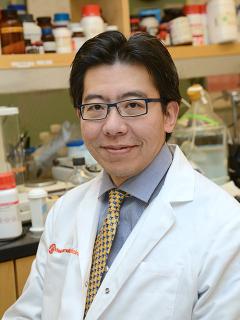
Dr. Joe Zhou
In a preclinical study, Dr. Joe Qiao Zhou and colleagues have discovered that the loss of the gene SATB2 contributes to changes in stem cells that typically develop into the inner lining of the colon, or large intestine, and furthermore, that these changes in stem cells transform them into a type of cell that normally would line a portion of the small intestine called the ileum. The researchers also found that the presence of the SATB2 gene enables other intestinal cell types to develop and retain colon cell-like properties.
Published in Cell Stem Cell (September 27, 2021), these findings have opened a window on illuminating the development of inflammatory bowel disease (IBD), as well as insights into a rare syndrome in which the SATB2 gene is disrupted. “While the role of this gene in the colon was previously unknown, we found that SATB2 has the ability to control the plasticity of colon stem cells through the regulation of hundreds of other genes,” says senior author, Dr. Zhou, Assistant Professor of Regenerative Medicine in Medicine, Division of Regenerative Medicine, WDOM. It is known that when people sustain an injury to the body, stem cells can reproduce to become a wide range of different cells; for example, those in the brain, the skin or the gut. “You can reproduce exactly what you lost,” explains Dr. Zhou. Metaplasia, a process where one tissue takes on the properties of another tissue, can have consequences and can be a precursor to the development of IBD or even colon cancer.
The gene SATB2 has traditionally been known for its expression in brain and craniofacial tissue, and partial loss of the gene can result in SATB2-associated syndrome. Patients who have this syndrome may also have problems with their gastrointestinal system. “This is another area of research we’re planning on looking into,” says Dr. Zhou.
As noted in the WDOM’s Annual Report 2020, Dr. Zhou’s laboratory has made seminal contributions to regenerative biology. His laboratory pioneered a new approach of regenerating pancreatic insulin-secreting beta cells in mature pancreas by directly reprogramming pancreatic acinar cells with defined genetic factors. This study is the first proof-of-concept that cells in adult organs can be reprogrammed in vivo, which led to numerous subsequent studies of adult tissue plasticity.

